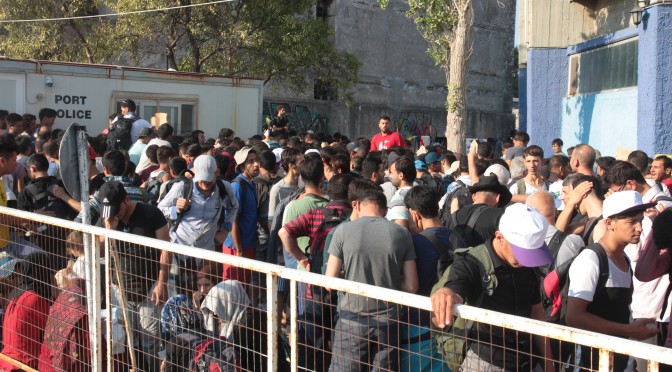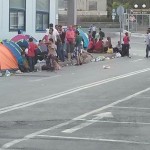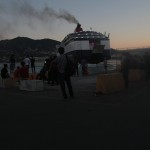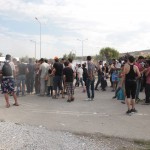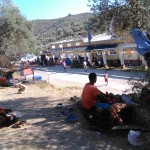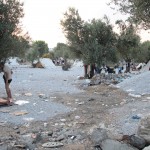The people face unbearable conditions here: families even with young children and babies have to sleep outside on the ground in the overcrowded camps and in the harbor, without a tent, without a blanket, often even without anything under them. Some of them lost everything on the boat: Today we met a woman, traveling alone with her three small children. She not only lost her passport, her money, everything on the boat between Turkey and Lesvos. We managed to buy some baby food and pampers, we could offer shoes for the children from our donations. But she is just one of so many people here on the island. Around 80.000 refugees arrived in 2015 on Lesvos. The island as a whole has 86.000 inhabitants.
Who goes today in the harbor? Who’s heading for Kara Tepe? And who to Moria? These are the finishing questions of our daily plenary. After “using” the midday heat in the shade sitting to reflect on the yesterday, and to plan the today, we head to these the three places – equipped with many info flyers, water, often also medicine, clothing and paper and pens.
To the harbor in Mitilini refugees go directly after they have arrived on the island and need to register for the first time. From there they are brought into the camps either Kara Tepe or Moria. After their second registration, after having got the white paper, with which they have the right to buy a ferry ticket to the mainland, they go again to the harbor for buying a ferry-ticket waiting for the date to have the chance to leave the island and go on their way to Europe.
Talking to the refugees and migrants, it is for us always a major concern, to welcome them, to tell them that we are happy that they have made it this far, trying to give them informations and contact phone numbers and further that might help on the next part of their trip – mostly through the Balkans.
Talking abut the numbers is just the one side. Behind every number we find a human, we find a live with hope and fear and desperate.
Our work in this harsh and inhuman situation seems like not even a drop on a hot stone, but is on the other hand more important than ever.
Many volunteers try to face this difficult situation. But this will not really change it or solve it. It is not the responsibility of Lesvos, nor of Greece to work on it. It is an European issue. And finding solutions means to accept that the border does not exist anymore in reality and that all energy and resources should be used to support the refugees instead of closing the borders.

